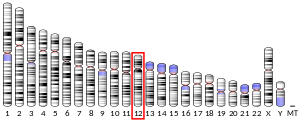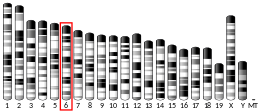Structure and function
edit
Based on the crystalographic and cryo-EM studies of its homolog in chicken (cLPCAT3),[ 9] [ 10] [ 11]
Inhibition of LPCAT3 has been found to alter the cellular lipidome and is partially protective against ferroptosis .[ 12]
^ a b c GRCh38: Ensembl release 89: ENSG00000111684 – Ensembl , May 2017^ a b c GRCm38: Ensembl release 89: ENSMUSG00000004270 – Ensembl , May 2017^ "Human PubMed Reference:" . National Center for Biotechnology Information, U.S. National Library of Medicine .^ "Mouse PubMed Reference:" . National Center for Biotechnology Information, U.S. National Library of Medicine .^ Ansari-Lari MA, Muzny DM, Lu J, Lu F, Lilley CE, Spanos S, et al. (April 1996). "A gene-rich cluster between the CD4 and triosephosphate isomerase genes at human chromosome 12p13" . Genome Research . 6 (4): 314–326. doi :10.1101/gr.6.4.314 PMID 8723724 . ^ Ansari-Lari MA, Shen Y, Muzny DM, Lee W, Gibbs RA (March 1997). "Large-scale sequencing in human chromosome 12p13: experimental and computational gene structure determination" . Genome Research . 7 (3): 268–280. doi :10.1101/gr.7.3.268 PMID 9074930 . ^ Zhao Y, Chen YQ, Bonacci TM, Bredt DS, Li S, Bensch WR, et al. (March 2008). "Identification and characterization of a major liver lysophosphatidylcholine acyltransferase" . The Journal of Biological Chemistry . 283 (13): 8258–8265. doi :10.1074/jbc.M710422200 PMID 18195019 . ^ "Entrez Gene: MBOAT5 membrane bound O-acyltransferase domain containing 5" .^ Zhang Q, Yao D, Rao B, Jian L, Chen Y, Hu K, et al. (November 2021). "The structural basis for the phospholipid remodeling by lysophosphatidylcholine acyltransferase 3" . Nature Communications . 12 (1): 6869. Bibcode :2021NatCo..12.6869Z . doi :10.1038/s41467-021-27244-1 . PMC 8617236 PMID 34824256 . ^ Qian H, Zhao X, Yan R, Yao X, Gao S, Sun X, et al. (May 2020). "Structural basis for catalysis and substrate specificity of human ACAT1". Nature . 581 (7808): 333–338. Bibcode :2020Natur.581..333Q . doi :10.1038/s41586-020-2290-0 . PMID 32433614 . S2CID 214190451 . ^ Wang L, Qian H, Nian Y, Han Y, Ren Z, Zhang H, et al. (May 2020). "Structure and mechanism of human diacylglycerol O-acyltransferase 1" . Nature . 581 (7808): 329–332. Bibcode :2020Natur.581..329W . doi :10.1038/s41586-020-2280-2 . PMC 7255049 PMID 32433610 . ^ Reed A, Ichu TA, Milosevich N, Melillo B, Schafroth MA, Otsuka Y, et al. (June 2022). "LPCAT3 Inhibitors Remodel the Polyunsaturated Phospholipid Content of Human Cells and Protect from Ferroptosis". ACS Chemical Biology . 17 (6): 1607–1618. doi :10.1021/acschembio.2c00317 . PMID 35658397 . S2CID 249396449 .
Mehrle A, Rosenfelder H, Schupp I, del Val C, Arlt D, Hahne F, et al. (January 2006). "The LIFEdb database in 2006" . Nucleic Acids Research . 34 (Database issue): D415–D418. doi :10.1093/nar/gkj139 . PMC 1347501 PMID 16381901 . Kimura K, Wakamatsu A, Suzuki Y, Ota T, Nishikawa T, Yamashita R, et al. (January 2006). "Diversification of transcriptional modulation: large-scale identification and characterization of putative alternative promoters of human genes" . Genome Research . 16 (1): 55–65. doi :10.1101/gr.4039406 . PMC 1356129 PMID 16344560 . Wiemann S, Arlt D, Huber W, Wellenreuther R, Schleeger S, Mehrle A, et al. (October 2004). "From ORFeome to biology: a functional genomics pipeline" . Genome Research . 14 (10B): 2136–2144. doi :10.1101/gr.2576704 . PMC 528930 PMID 15489336 . Wiemann S, Weil B, Wellenreuther R, Gassenhuber J, Glassl S, Ansorge W, et al. (March 2001). "Toward a catalog of human genes and proteins: sequencing and analysis of 500 novel complete protein coding human cDNAs" . Genome Research . 11 (3): 422–435. doi :10.1101/gr.GR1547R . PMC 311072 PMID 11230166 . Hartley JL, Temple GF, Brasch MA (November 2000). "DNA cloning using in vitro site-specific recombination" . Genome Research . 10 (11): 1788–1795. doi :10.1101/gr.143000 . PMC 310948 PMID 11076863 . Maurel-Zaffran C, Chauvet S, Jullien N, Miassod R, Pradel J, Aragnol D (August 1999). "nessy, an evolutionary conserved gene controlled by Hox proteins during Drosophila embryogenesis". Mechanisms of Development . 86 (1–2): 159–163. doi :10.1016/S0925-4773(99)00105-7 . PMID 10446276 . S2CID 5793636 .




